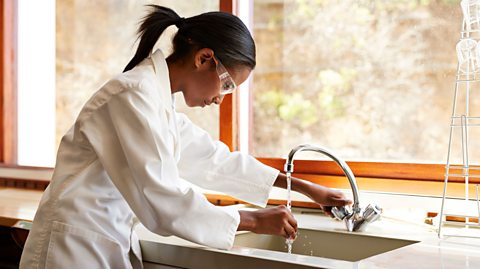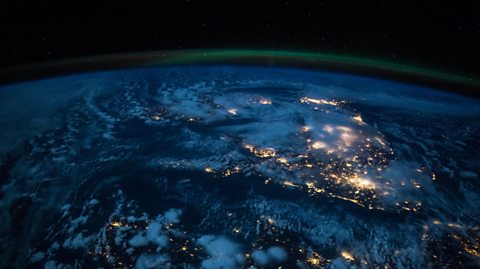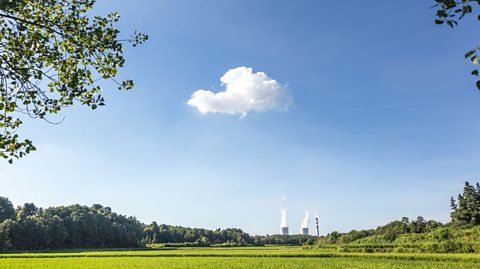The sun is shining (sometimes), we’ve got our sunglasses on, and it finally feels like summer.
Isn't it just the perfect time to throw some ice in your pop, fill up the paddling pool, and take some extra long, extra refreshing showers?
The truth is, while we’re all enjoying the beautiful weather, it’s easy to forget the importance of saving water. But wouldn’t it just be easier if we could make it from scratch? After all, we can manufacture all sorts of things these days, from diamonds to burgers.

H-2-Oh no!
In theory, it should be easy to make water. It’s just two hydrogen atoms and an oxygen atom thrown together; how hard can it be? The answer: very.
Just mixing hydrogen and oxygen together doesn’t make water – to join them together you need energy. The trouble with adding energy into the equation is that a large-scale chemical reaction of flammable hydrogen and oxygen (which is what keeps a fire burning) is likely to result in a rather large explosion. So, the whole thing is more dangerous than useful.
If we can’t make water easily from its atoms, are there any other ways we can create it? Well, scientists are now focusing more on harvesting water from the air and using humidity to their advantage. Unfortunately, most research into harvesting water from air is still in its early stages and is carried out on a small-scale; it’s certainly not ready to combat water shortages and drought.

The thirst is real
Drought isn’t the only reason we’re working towards being able to make water, though. The Earth’s population is constantly increasing, and the demand for water is increasing too.
On top of this, there are still parts of the world that don’t have access to clean water. Although around 71% of the Earth is water, most of this is salt water and so isn’t drinkable. Only 2% of the Earth’s water is fresh and safe to drink, and more than half of that is located in the polar ice caps where we can’t reach it. Furthermore, a lot of the clean, drinkable water we do have gets wasted, simply because we take it for granted.
It’s so easy for us to access water in our homes, and at work, that we forget it is a limited resource and could, one day, run out. For all of these reasons, it is becoming increasingly more important to find new ways to generate it.

Blue Planet II?
Scientists aren’t just interested in creating and harvesting water on Earth. In fact, their research extends into the furthest reaches of space. At the moment, NASA’s astronauts rely on their Water Recovery System to recycle hydrogen and carbon dioxide in space to make water (and methane). Up in space, they don’t have access to the rain and reservoirs that we have down here, so water is even more limited. It would be almost ideal if we could harvest water from space – but how possible is it?
Last year, scientists found evidence of ice located on the so-called dark side of the Moon. In previous years, similar ice formation has been observed on other planets, such as Mercury. As you can imagine, this sparked a lot of excitement in the scientific community. Being able to harvest water from the Moon and other planets not only opens up water resources beyond Earth, but it could also allow for exploration further into space.
But ice isn’t the only water resource in space. On Mars, there are a number of possible sources of water, we just need to find a way to harvest it. For example, water could be harvested from the atmosphere, from the ground, or even pulled from minerals - the possibilities are endless. Unfortunately, our technology isn’t quite that advanced just yet.

Water 'bout saving what we have?
While it is true that water is a renewable source, renewable does not mean infinite. An increase in population and rising temperatures (July was the hottest month across the globe ever recorded according to EU’s satellite-based Earth observation network) means there might be more time periods where our water is not well replenished by the rain cycle. So water conservation could become more and more important. And for now, being able to harvest water on a global, or even planetary scale is still out of reach.
What can we do to conserve the water we already have? The most important thing is not to take water for granted. Here are five helpful tips to help you reduce the amount you use:
- Take shorter showers. In the hot weather, it’s understandable to want to shower more often. However, when you do shower, keep it short, or even substitute a longer shower for a partially filled bath.
- Don’t leave the tap running when you’re not using it. This mostly occurs when you’re brushing your teeth or washing up – but, just think of all that wasted water just pouring down the drain!
- Only use your washing machine or dishwasher when it’s full. It saves much more water to run one full load than two or three partial loads.
- Don’t over-water your lawn and plants. Additionally, water them during cooler times of day. For example: in the evening, water won’t evaporate in the sun so less is wasted.
- Keep a bottle of water in the fridge instead of waiting for the tap to run cold.
The average person uses around 90,000 litres of water per year - that’s enough water to fill two petrol tankers! It’s even more scary to think that by 2025, over 60% of people are predicted to have limited access to fresh water.
Even the smallest conservation of water from a large number of people can make a huge difference.

How much do you really know about climate change?
We are always hearing about it in the news, but have you been paying attention?

Four jobs that could save the planet
The stories of four people who do their bit for our ecological future every time they clock in for a shift.
